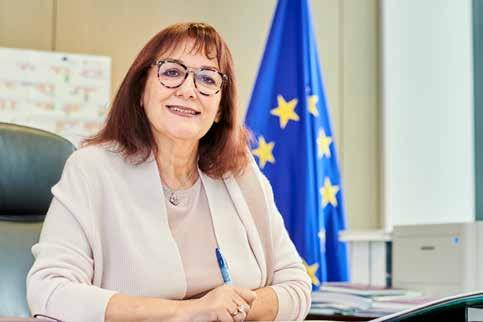
6 minute read
Alzheimer Europe speaks to Vice-President Dubravka Šuica about the EU’s plans on
Alzheimer Europe speaks to Vice-President Dubravka Šuica about the EU’s plans “It is crucial that we do not look at the issues of demographic developments, health and social policies in an isolated manner: they are on ageing demographics all intrinsically interlinked and condition each other.” As the population of EU ages and the numbers of people with dementia are projected to rise, Alzheimer Europe spoke to the European Commission’s Vice-President for Democracy By 2070, more than 30% of the population is projected to be aged 65 or older, compared to approximately 20% now. This has a wide and Demography, Dubravka Šuica, about the EU’s plan for a variety of impacts on our lives – both at an Green Paper on Ageing. In the interview, the Vice-President individual but also population level, as well as at a social and economic level. Therefore, outlines the focus of the Green Paper and how it will tie into the Green Paper will not only be about older other areas of EU Policy and the next steps for its development persons but also about how all of this plays out for the younger generation. It will be about and implementation. ageing and not only about the aged. We will look at social and fiscal impacts, especially in the care sector and at labour markets but we What can we expect to see in the Green and presenting the evidence on demo- will also approach these issues from a health Paper on Ageing, due for publication 2021? graphic trends and looking at the impact perspective. While we are still in an early phase they have on the lives of European citizens. of preparations, it is obvious to me that this The Green Paper on Ageing is my first policy On average, we live longer and healthier Green Paper will need to clearly address the initiative emanating from the Commis- lives, even if this may sound counterintu- challenges that come with an ageing society, sion Report on the Impact of Demographic itive given the reality of COVID-19. At the as much as pointing to opportunities that we Change, which we published in June 2020. same time, fewer children are being born have not identified or exploited enough so far. This report lays the ground for the Green in Europe, so as a result the overall populaPaper and other future work, by collecting tion is ageing. Alzheimer Europe recently published the
Dementia in Europe Yearbook 2019 which showed that the numbers of people living with dementia will double by 2050 due to significantly ageing demographics in Europe – how can dementia be prioritised in the Green Paper?
Advertisement
Vice-President of Democracy and Demography, Dubravka Šuica Dementia is a disease that hits the elderly in particular. It affects their well-being, their quality of life and also takes a considerable toll on those around them, be it family, friends or carers. With the gradually changing age structure in Europe, this is already becoming a key challenge. Yet, we are also making medical and scientific progress and are learning how to better support persons living with dementia. Since the Green Paper will address in particular the needs that arise in an ageing society, we will take a closer look at what this means for our healthcare and long-term care systems but also intergenerational solidarity and dignity.
The COVID-19 pandemic has shown us in stark terms which kind of challenges arise when communicable diseases put health and lives, especially of older persons, at risk. Likewise, non-communicable diseases such as dementia require the preparedness of our care systems. This needs to be an integral part of ensuring our societies and economies are prepared and can manage the impact of ageing societies with their very own health and disease patterns. And eff ectively, the current pandemic has also highlighted the links between the diff erent challenges: in order to protect the most vulnerable people in society from the novel Coronavirus, many older persons, particularly in care homes, have been subject to stricter containment and isolation measures. They have suff ered from loneliness and a lack of social stimulation, which can negatively aff ect mental health and increase the likelihood of dementia, or exacerbate it when it is already present.
In terms of competencies for the EU, what do you envisage will be the key areas of focus for the EU in addressing the future demographic changes, particularly in relation to ageing and dementia?
While many of the competencies in these areas in the hands of Member States, at the EU level we are ready to lead the way by identifying relevant issues and supporting national, regional and local action. There is a lot that we can learn from each other even if the specifi c challenges and competencies vary from Member State to Member State or even from region to region, or cities to rural areas. During the last months, I have engaged with many governments, parliaments but also non-governmental bodies or initiatives on demographic challenges. There is a vast interest and appetite for exchanging views, best practices and lessons learnt on demographic challenges. This is what we want to facilitate, in order to ensure that we pool resources and seek joint solutions: Europe is at its strongest and best when we work together and pull in the same direction.
Against this background, the Commission also proposed a new and ambitious funding
Vice-President Šuica tweets her support on World Alzheimer’s Day, 21 September 2020

programme on health (the EU4Health programme) as part of the revised long-term budget of the Union. We want to boost the preparedness of major cross-border health threats, strengthen our health systems, and make medicines, vaccines and medical devices available and aff ordable. This should help us in improving the preparedness for dealing both with communicable and non-communicable diseases in the future.
The long-term budget of the EU and its programmes, such as EU4Health, are currently being negotiated between Parliament, Council and Commission and I very much hope that we recognise the importance of acting together on health.
How will the EU work to ensure that the work on demographic change, the EU4Health programme, social rights and other relevant work streams are linked together?
It is crucial that we do not look at the issues of demographic developments, health and social policies in an isolated manner: they are all intrinsically interlinked and condition each other. Ageing societies come with diff erent health patterns, which aff ects the way people can use their rights or have diff erent needs.
Therefore, this Commission has from the very beginning of its mandate worked as a team; my colleagues and I in the College work together in thematic project groups and regularly exchange on those topics, and so do the services. For example, with regard to my work on demography, the Commissioner for Health, Stella Kyriakides, the Commissioner for Jobs and Social Rights, Nicolas Schmit, and I regularly discuss the respective initiatives that we pursue in our respective portfolios and engage closely in topics where our responsibilities converge. Therefore, I am closely working with Commissioner Schmit on the implementation of the European Pillar of Social Rights where aspects on ageing play a key role. At the same time, Commissioner Kyriakides and her services will contribute to the Green Paper on Ageing under my leadership.
What are the next steps aft er the Green Paper?
The Green Paper on Ageing will launch a wider debate and public consultation on the long-term impacts, notably on care, pensions, health and on how to foster active ageing. It means we will engage in an exchange with stakeholders and are looking for their input and experiences. This will help us in preparing the concrete follow-up steps among with the question of care will certainly play a key role. This we will determine during the course of 2021.










